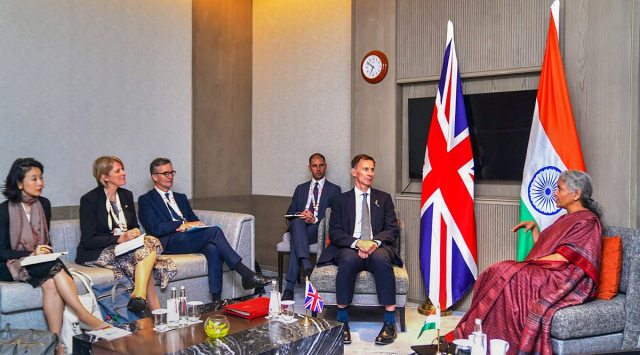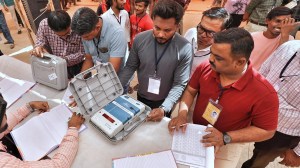- India
- International
G20 finance meet ends, no consensus on Ukraine
Finance Minister Nirmala Sitharaman said G20 members have agreed to deepen discussions around crypto assets and understand their broader implications.
 Union Finance Minister Nirmala Sitharaman with Jeremy Hunt, UK's Chancellor of Exchequer, ahead of the FMCBG meeting. (PTI)
Union Finance Minister Nirmala Sitharaman with Jeremy Hunt, UK's Chancellor of Exchequer, ahead of the FMCBG meeting. (PTI) The first meeting of G20 Finance Ministers and Central Bank Governors (FMCBG) in Bengaluru under India’s presidency stopped short of issuing a Communique of its resolutions and released instead a “Chair’s Summary and Outcome Document” after Russia and China opposed the paragraphs condemning Russia’s war on Ukraine.
The Chair’s Summary and Outcome Document, which was otherwise agreed upon by all members, retained the words of the G20 Bali Leaders’ Declaration (November 15-16, 2022) regarding the Russia-Ukraine war.
Responding to a question on why there was a Chair’s Summary instead of a Communique, Union Finance Minister Nirmala Sitharaman said paragraphs 3 and 4 of the Summary were “exactly what the Bali Leaders’ Summit had come up with… But, two countries — Russia and China — had reservations. So, with a footnote, certainly a Communique can’t go out. And therefore, it had to be a Chair’s Summary and Outcome Document”.
The two contested paragraphs reiterated the stance of member nations about the ongoing war, and deplored “in the strongest terms the aggression by the Russian Federation against Ukraine” while demanding Russia’s “complete and unconditional withdrawal from the territory of Ukraine”.
The “peaceful resolution of conflicts, efforts to address crises, as well as diplomacy and dialogue, are vital,” and “Today’s era must not be of war”, the paragraphs opposed by Russia and China underlined.

Economic Affairs Secretary Ajay Seth said Russia and China took the position that finance ministers and central bank governors should not get into geopolitical issues and that the mandate of FMCBG nations was to discuss economic issues.
The summary noted enhancing international policy cooperation and steering the global economy towards securing strong, sustainable, balanced and inclusive growth.
While noting that global economic outlook had “modestly improved” since the last meeting in October 2022, it pointed out that global growth remained slow, and downside risks to the outlook persisted, including elevated inflation, a resurgence of the pandemic and tighter financing conditions that could worsen debt vulnerabilities in many Emerging Market and Developing Economies (EMDEs).
The G20 members agreed to continue to enhance macro policy cooperation and reiterated the need for well-calibrated monetary, fiscal, financial, and structural policies to promote growth and maintain macroeconomic as well as financial stability.
“We will use macroprudential policies, where required, to safeguard against downside risks. We will prioritise temporary and targeted fiscal support to vulnerable groups while maintaining medium-term fiscal sustainability. Central banks remain strongly committed to achieving price stability, in line with their respective mandates. They will ensure inflation expectations remain well anchored and will clearly communicate policy stances to help limit negative cross-country spillovers,” it stated.
With regard to debt, Economic Affairs Secretary Seth said there were issues around transparency of debt and whether multilateral institutions should be part of any debt restructuring, adding that China had a different view.
The discussions of the first session of the G20 FMCBG meeting, which concluded Saturday, focused on issues relating to international financial architecture, sustainable finance and infrastructure. Rising debt levels affecting developing countries was also an important feature in the discussions. According to a new policy brief published Wednesday by the United Nations Development Programme (UNDP), 52 low and middle-income developing economies are either in debt distress or at high risk of debt distress, accounting for more than 40 per cent of the world’s poorest people.
The Chair’s summary stated that it recognises the urgency to address debt vulnerabilities in low and middle-income countries, pointing to the key role played by Multilateral Development Banks (MDBs) in development financing.
“Taking forward the mandate given by the G20 Leaders in Bali, we task the International Financial Architecture Working Group to work with the MDBs to develop a G20 Roadmap, for implementing the recommendations of the G20 Independent Review of MDBs Capital Adequacy Frameworks (CAF) based on updates from MDBs in Spring 2023. We look forward to receiving the roadmap in our third meeting in 2023,” it stated.
The summary also mentioned commitment towards swift implementation of the OECD/G20 two-pillar international tax package along with ongoing work by the Financial Stability Board and international standard setters for the crypto-assets ecosystem, including so-called stablecoins, to ensure that it is closely monitored and subject to robust regulation, supervision, and oversight to mitigate potential risks to financial stability.
“We recognise the urgent need to establish effective anti-money laundering and counter-terrorism financing regulations and oversight of virtual assets, especially to prevent their use in money laundering and terrorism financing, in line with FATF Standards,” it stated.
Apr 18: Latest News
- 01
- 02
- 03
- 04
- 05






































